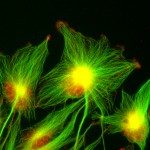Lien vers Pubmed [PMID] – 1696629
J. Acquir. Immune Defic. Syndr. 1990;3(9):859-72
The 177 N-terminal amino acids of CD4, the receptor of the human immunodeficiency virus (HIV), have been expressed in Escherichia coli as genetic fusions to the periplasmic maltose-binding protein (MalE) from this organism. A large fraction of the hybrid proteins can be released from the periplasm by osmotic shock and purified in one step on a cross-linked amylose column eluted with maltose under mild conditions. One hybrid protein binds HIV envelope protein gp160 and neutralizes the virus in vitro. This provides the first example of the production and one-step purification of an active form of an eukaryotic protein by fusion to MalE. The use of this system for mass screening of CD4 mutants, high-scale production of the hybrid protein for structural studies on CD4, testing antiviral compounds, and therapeutic assays is discussed.

